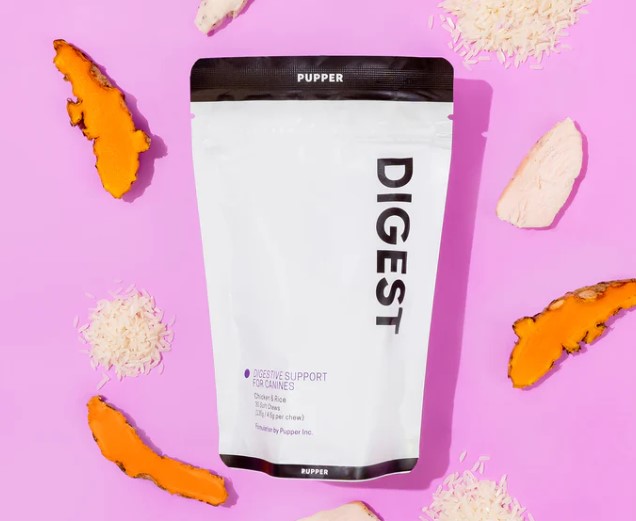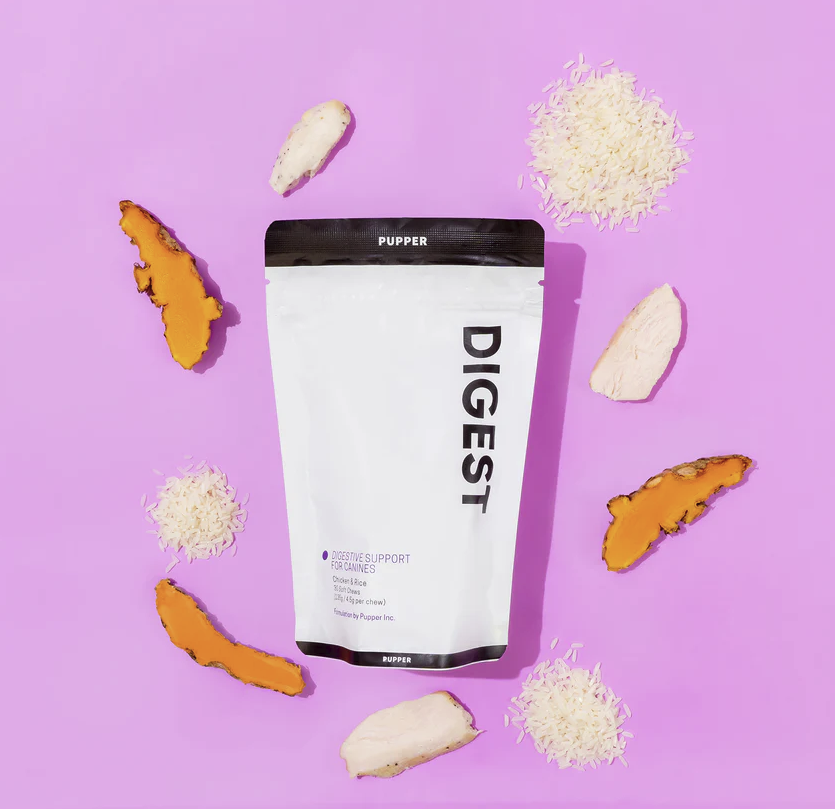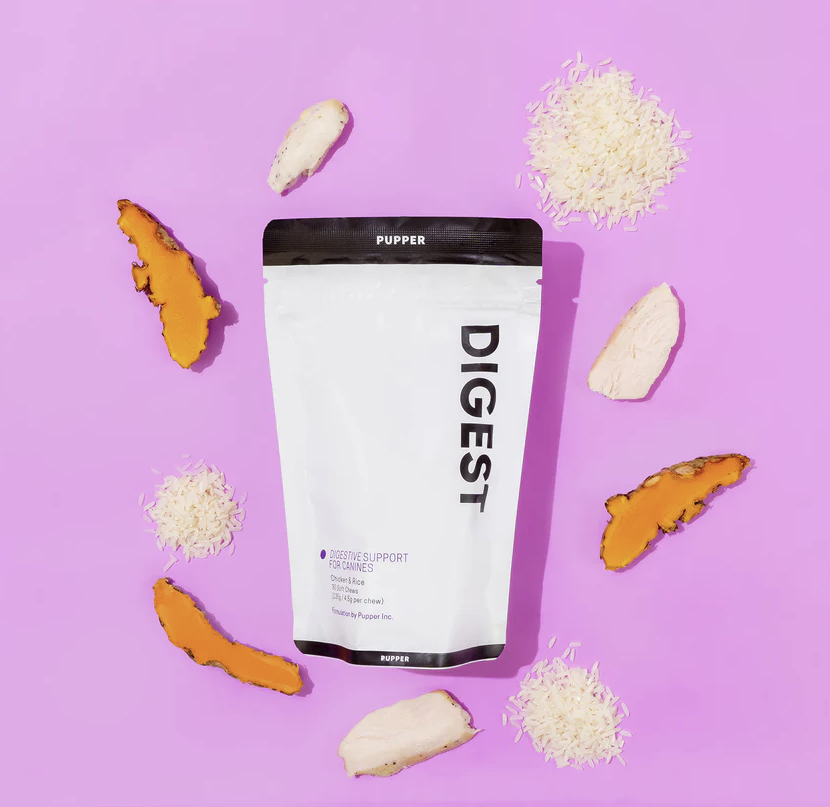When a dog owner sees blood in their dog's poop, it can be a cause for concern. While it's not always a sign of a serious health issue, it's important to understand the potential causes and what to do next. There are several reasons why a dog may be pooping blood, and it's crucial to identify the underlying cause to ensure proper treatment.
Supplements For Dog Pooping Blood
- Pupper Digest
- Wholistic Pet Organics Digest All
- Greenies Digestive Probiotic Supplement Powder for Dogs
- ThorneVet Gastriplex
- PetLabCo Probiotic Chew
- Arkus Daily
- Herbsmith GastroCare
- Bernie's Perfect Poop
- PetNC Natural Care Pre & Probiotic Soft Chews Digestive Supplement
- Reggie Pumpkin Probiotic Powder
- Only Natural Pet Protein Topper Digestive Support
One of the most common causes of blood in a dog's poop is gastrointestinal (GI) tract inflammation, also known as gastroenteritis. This inflammation can occur anywhere in the digestive tract, including the stomach, small intestine, colon, or anal region. When blood is present, it's called hemorrhagic gastroenteritis.
Other potential causes of blood in a dog's poop include parasites, infections, food allergies, stress, tumors, and more. It's important to note that while some causes are minor and easily treatable, others can be serious and require immediate veterinary attention.
Causes of Blood in Dog Stool
When a dog poops blood, it can be a sign of a serious health issue. Here are some of the common causes of blood in dog stool:
Parasites
Parasites such as hookworms, whipworms, and roundworms can lead to bloody stool in dogs. These parasites can cause intestinal inflammation, leading to bleeding. Dogs can get these parasites by ingesting contaminated soil, water, or food.
Dietary Issues
Changes in diet can also cause bloody stool in dogs. Feeding your dog a new type of food, treat, or chew toy can lead to digestive issues, including bloody stool. Dogs can also develop food allergies or intolerances that can cause inflammation and bleeding in the digestive tract.
Infections
Infections in the digestive tract can cause bloody stool in dogs. Bacterial infections such as salmonella or E. coli can lead to inflammation and bleeding. Viral infections such as parvovirus can also cause bloody stool in dogs.
Inflammatory Bowel Disease
Inflammatory bowel disease (IBD) is a chronic condition that can cause inflammation and bleeding in the digestive tract. IBD can be caused by a variety of factors, including food allergies, genetics, and environmental factors.
Cancer
Cancer can also cause bloody stool in dogs. Tumors in the digestive tract can lead to bleeding. Some types of cancer can also affect the blood's ability to clot, leading to bleeding.
Symptoms of Blood in Dog Stool
When a dog poops blood, it is a sign that something is wrong. There are several symptoms to look out for if you suspect your dog is pooping blood. In this section, we will discuss the different symptoms that may indicate blood in your dog's stool.
Visible Blood in Stool
One of the most obvious symptoms of blood in a dog's stool is visible blood. If you notice bright red blood in your dog's stool, it could be a sign of bleeding in the lower digestive tract. This could be caused by a variety of factors, including parasites, infections, or tumors.
Dark, Tarry Stool
If your dog's stool is dark and tarry, it could indicate that there is blood in the stool. This type of stool is usually black or dark brown and has a sticky, tar-like consistency. This could be a sign of bleeding in the upper digestive tract, such as the stomach or small intestine.
Diarrhea
Diarrhea is another symptom that may indicate blood in your dog's stool. If your dog has diarrhea that is accompanied by blood, it could be a sign of a bacterial or viral infection, parasites, or other digestive issues.
Vomiting
Vomiting is a common symptom of many health problems in dogs, including blood in the stool. If your dog is vomiting and has blood in their stool, it could be a sign of a more serious condition, such as an obstruction or an ulcer.
Loss of Appetite
If your dog is not eating or drinking as much as usual, it could be a sign of blood in their stool. This could be due to pain or discomfort in the digestive tract, which may be caused by bleeding or inflammation.
In conclusion, if you notice any of these symptoms in your dog, it is important to take them to a veterinarian as soon as possible. Blood in a dog's stool can be a sign of a serious health problem, and early diagnosis and treatment are essential for a successful outcome.
Diagnosis and Treatment
When a dog is pooping blood, the first step is to take them to a veterinarian. The veterinarian will conduct a physical exam and ask for the dog's medical history. During the physical exam, the vet will check the dog's vital signs, abdominal palpation, and rectal examination. The medical history will include questions about the dog's diet, recent changes in diet, and any medications that the dog is taking.
Fecal Tests
Fecal tests are used to check for parasites, bacteria, and other infections that may be causing the blood in the dog's stool. The veterinarian will collect a stool sample and examine it under a microscope to look for any abnormalities.
Blood Tests
Blood tests are used to check for any underlying medical conditions that may be causing the blood in the dog's stool. The veterinarian will check for anemia, liver and kidney function, and other blood abnormalities.
Imaging Tests
Imaging tests such as x-rays or ultrasounds are used to check for any abnormalities in the dog's digestive system. This can help identify any tumors, blockages, or other issues that may be causing the blood in the dog's stool.
Treatment Options
The treatment for a dog pooping blood will depend on the underlying cause. If the cause is an infection, the veterinarian may prescribe antibiotics or other medications. If the cause is a dietary issue, the veterinarian may recommend a change in diet. In more severe cases, surgery may be necessary.
It is important to follow the veterinarian's recommended treatment plan and to monitor the dog's progress. In some cases, additional testing or treatment may be necessary. Regular check-ups with the veterinarian can help ensure that the dog is healthy and that any issues are caught early on.
Prevention and Management
Preventing and managing bloody stools in dogs requires a combination of proper nutrition, regular exercise, regular veterinary checkups, and healthy lifestyle habits.
Proper Nutrition
Feeding your dog a balanced diet that includes all the necessary nutrients is crucial for maintaining their digestive health. Ensure that your dog's food is rich in fiber, which helps regulate bowel movements and prevent constipation. Avoid sudden dietary changes, as these can lead to bloody stools. Additionally, be mindful of any food allergies your dog may have and avoid feeding them foods that trigger an allergic reaction.
Regular Exercise
Regular exercise is essential for maintaining your dog's overall health, including their digestive health. Exercise helps stimulate bowel movements and prevent constipation. Take your dog for regular walks and engage them in physical activities that they enjoy.
Regular Veterinary Checkups
Regular veterinary checkups are crucial for preventing and managing bloody stools in dogs. Your veterinarian can identify any underlying health issues that may be causing the problem and recommend appropriate treatment. Additionally, they can provide guidance on proper nutrition and lifestyle habits that can help prevent bloody stools.
Healthy Lifestyle Habits
In addition to proper nutrition, regular exercise, and regular veterinary checkups, there are several healthy lifestyle habits that can help prevent and manage bloody stools in dogs. These include:
- Providing plenty of fresh, clean water to prevent dehydration
- Avoiding exposure to toxins and other harmful substances
- Regularly cleaning your dog's living area to prevent the spread of bacteria and parasites
- Regularly grooming your dog to prevent the buildup of fecal matter around their anus, which can lead to irritation and infection
By following these prevention and management tips, you can help ensure your dog's digestive health and prevent the occurrence of bloody stools.
1. Pupper Digest
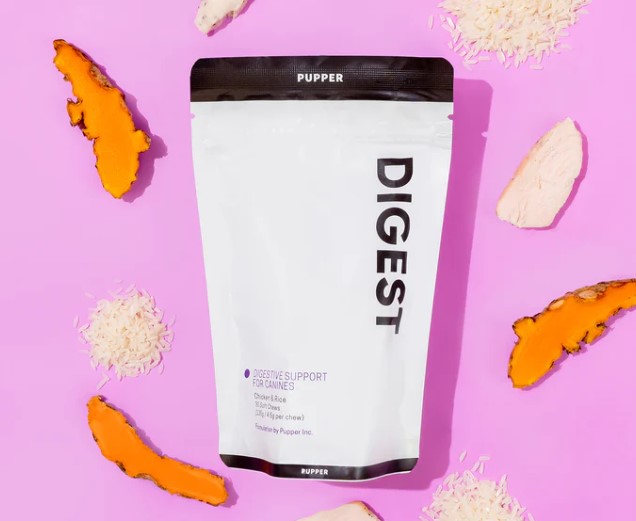
Introducing Pupper Digest's exclusive line of canine digestive soft chews! This carefully crafted formula consists of premium ingredients, meticulously selected to provide optimal support for dogs' digestive systems. Designed to address various digestive issues, these chews are perfect for canines experiencing distressing symptoms like bloody stools.
By nourishing their digestive tract, Pupper Digest's soft chews aim to alleviate discomfort and promote overall digestive health in dogs facing such concerns.
2. Wholistic Pet Organics Digest All
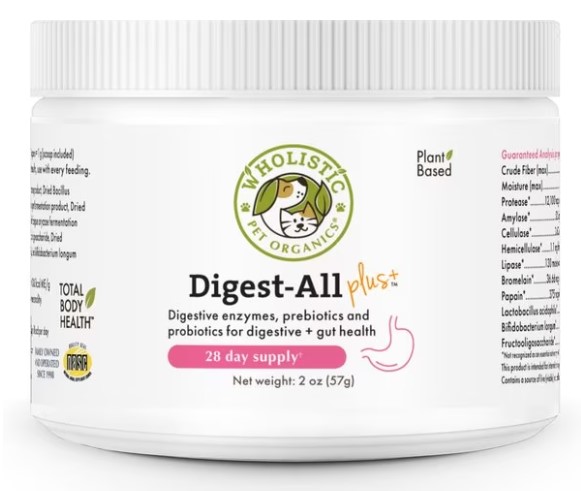
Enhance your furry companion's gut health with the Wholistic Pet Organics Digest-All Plus Digestive Support Supplement, specially formulated for dogs and cats. This unique blend of concentrated and powerful plant-based digestive enzymes, prebiotics, and probiotics is designed to optimize digestion and enhance nutrient absorption.
3. Greenies Digestive Probiotic Supplement Powder for Dogs
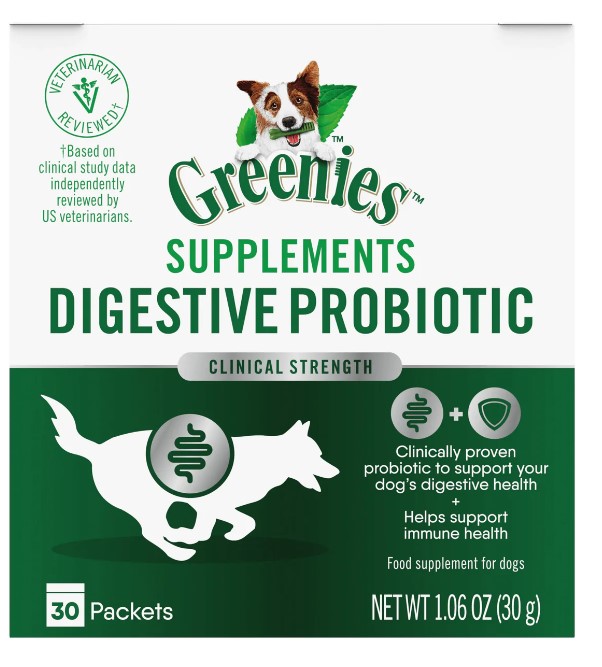
Introducing Greenies Digestive Probiotic Supplement Powder, a specially formulated powder topper that aids in maintaining a natural balance in your dog's digestive system. Suitable for dogs of all ages, including puppies, adults, and seniors, this supplement powder offers numerous benefits.
By simply sprinkling it on their food, you provide a daily probiotic boost that supports digestive health and bolsters their immune system. Crafted with high-quality ingredients and free from artificial flavors, preservatives, or colors, Greenies Digestive Probiotic Supplement Powder is a reliable choice. It contains billions of live and active probiotics that have been scientifically proven to enhance your dog's intestinal microbiome.
4. ThorneVet Gastriplex
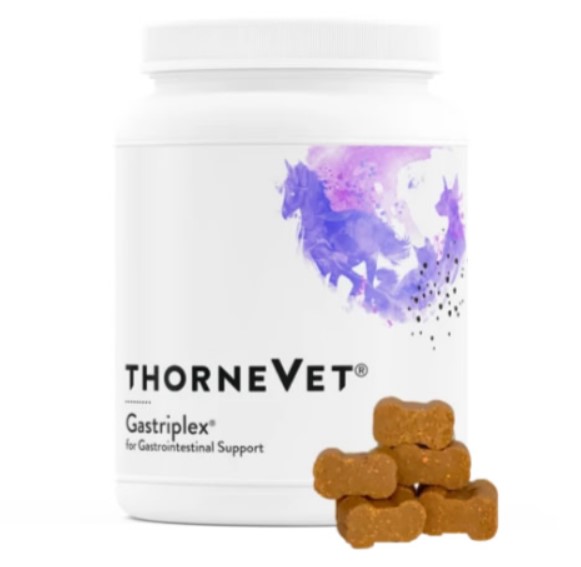
Introducing Gastriplex Chews, a highly advantageous solution for dogs and cats dealing with digestive ailments like vomiting, diarrhea, colitis, and various gastrointestinal issues. These chews provide targeted relief and support for your pet's delicate digestive system.
5. PetLabCo Probiotic Chew
![PetlabCo Probiotic Chew ]](https://www.newsdirect.com/hs-fs/hubfs/PetlabCo%20Probiotic%20Chew%20%5D.jpg?width=522&height=293&name=PetlabCo%20Probiotic%20Chew%20%5D.jpg)
Elevate your dog's overall well-being and satisfaction with the ultimate health solution! Experience the leading Probiotic Chew2 for dogs, renowned as America's bestseller. This extraordinary formula encompasses prebiotics, eight potent probiotic strains, and an array of other beneficial ingredients.
6. Arkus Daily
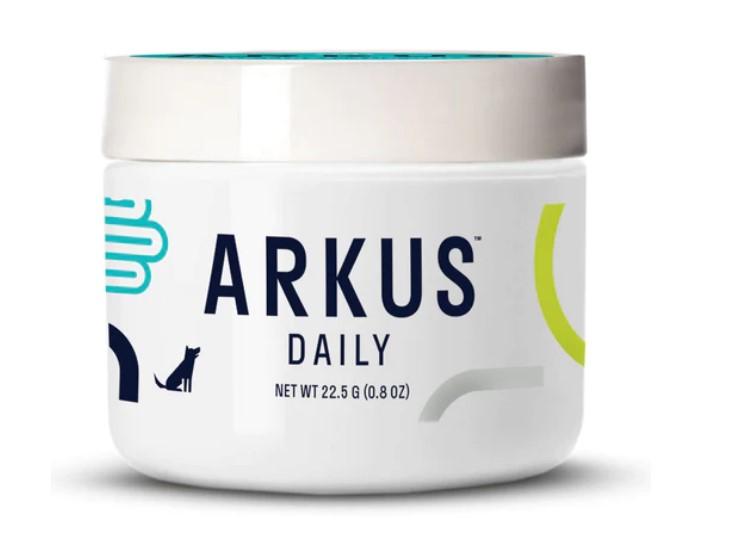
Arkus Daily Five, the acclaimed natural supplement, consists of a carefully curated selection of ingredients. These include Dried Clostridium hiranonis Fermentation Product, Dried Megamonas funiformis Fermentation Product, Dried Enterococcus faecium Fermentation Product, Nutritional Yeast Flakes, and Inulin.
7. Herbsmith GastroCare
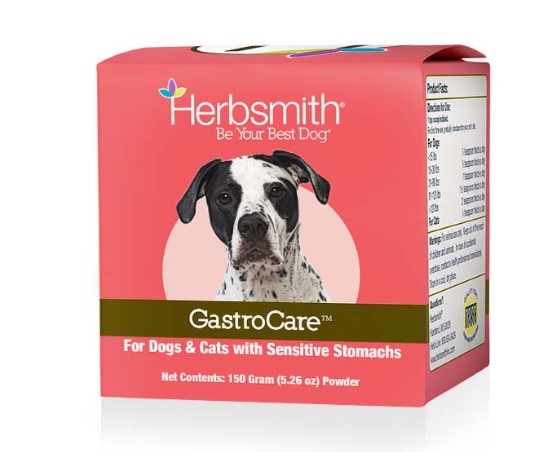
Herbsmith GastroCare, the ultimate solution for promoting digestive health in your furry companion. Crafted with meticulous care and expertise, this remarkable formula is designed to provide comprehensive support for your pet's gastrointestinal system.
8. Bernie's Perfect Poop
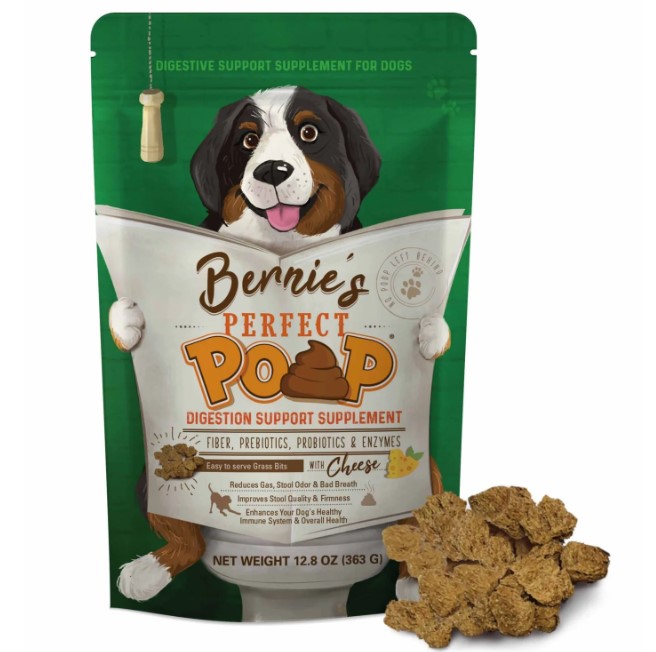
Say goodbye to the hassle of purchasing multiple supplements to support your beloved companion's gut health. With this groundbreaking formula, you'll find everything your BFF needs in one place, including fiber, prebiotics, probiotics, and enzymes. Proper digestion is crucial for optimal nutrient absorption, and this revolutionary supplement helps ensure your furry friend receives the essential nutrients they need to thrive.
9. PetNC Natural Care Pre & Probiotic Soft Chews Digestive Supplement
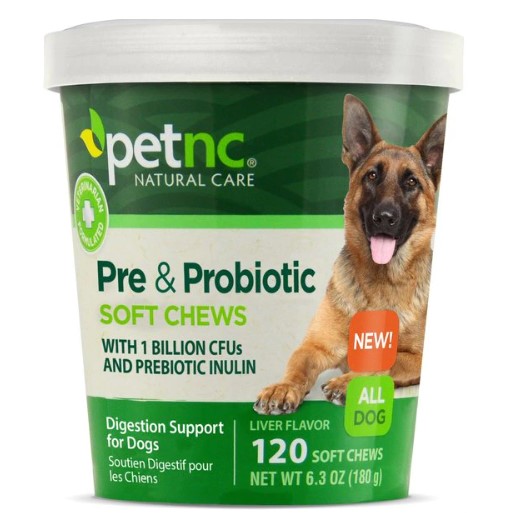
Elevate your furry friend's "gut instincts" with PetNC Natural Care Pre & Probiotic Soft Chews Dog Supplement. Carefully developed by veterinarians, this daily supplement is specifically designed to provide comprehensive support for your dog's digestive tract.
10. Reggie Pumpkin Probiotic Powder
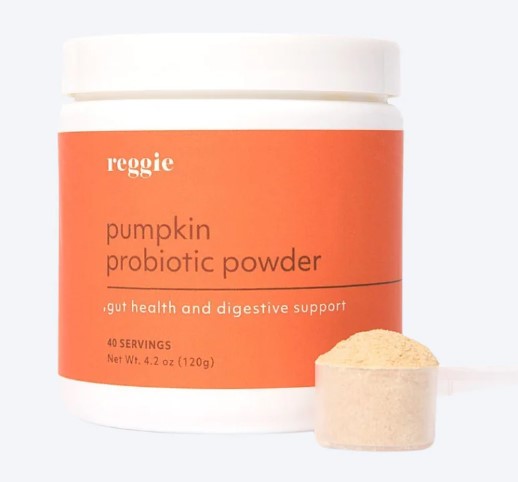
Unlock the potential of a healthy gut with Reggie's Pumpkin Probiotic Powder for dogs. This remarkable product is expertly formulated to support and maintain long-term gut and digestive tract health in canine companions. By regulating bowel movements, including addressing instances of stool irregularity like diarrhea and constipation, it offers much-needed relief and balance. Going beyond digestive support, this powder also strengthens the immune system, normalizing conditions within the GI tract, which plays a pivotal role in a dog's overall immune function.
11. Only Natural Pet Protein Topper Digestive Support
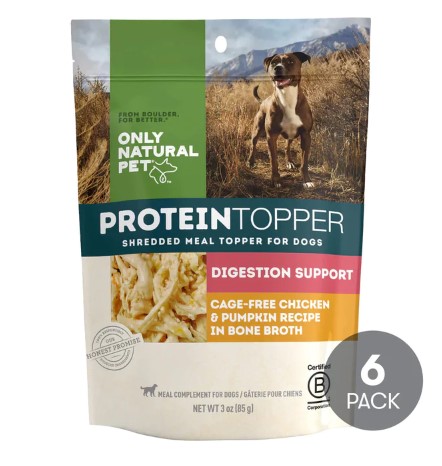
Discover the exceptional benefits of Only Natural Pet ProteinTopper Digestion Support Shredded Meal Topper for Dogs, an ingenious and practical addition to your furry companion's meals. This innovative topper combines the digestive-supporting advantages of pumpkin with the delectable taste of cage-free chicken.

